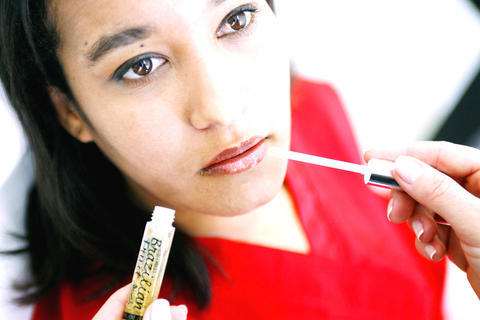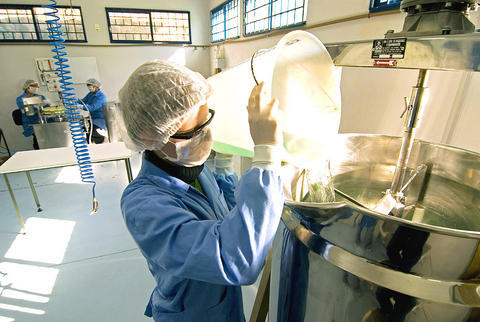Brazilians' longtime devotion to the body beautiful -- whether it be spending fortunes on perfumes and cosmetics, slimming down to fit into minuscule swimsuits or revealing body waxing -- is paying off.
Exports of beauty products have been rising quickly in the last few years. In 2006, Brazilian companies exported US$484 million of cosmetics, toiletries and fragrances, said Joao Carlos Basilio da Silva, president of the Brazilian Toiletry, Perfumery and Cosmetic Association. That was up 152 percent from 2001, he said.
In a retail market keen on the word "natural," the country's abundant supply of natural oils, fruits and plant extracts has played a crucial role, too, in the increase in sales.

PHOTO: NY TIMES NEWS SERVICE
The Brazilian Amazon has around 13,000 plant species, according to the agricultural research agency Embrapa. Only a tiny fraction of those plants have been comprehensively analyzed and less than 1 percent currently provide active ingredients for cosmetics, according to experts.
For years, Amazonia's indigenous peoples have celebrated fruits for their special qualities. The guarana berry, for example, is known as a stimulant. The fruit of the cupuacu tree is a source of oil celebrated for its moisturizing qualities. Acai, another berry, is high in antioxidants and rich in energy. And passion fruit is used throughout Brazil to calm nerves. All are now used in making cosmetics.
Brazilian producers do not claim that those ingredients are better or healthier than those found in species growing elsewhere or that their ingredients are superior to traditional components like animal fats. But they do believe their "Brazilianness" is a major factor in the rising sales.

PHOTO: NY TIMES NEWS SERVICE
Industry executives in Brazil say that the country's products are seen as somehow purer than ones from other parts of the world.
"If you pick a rose from the Amazon and a rose from the middle of France, the Brazilian one will be a lot less polluted," said Eduardo Rauen, commercial director of Amazonia Natural, a company whose exports are expected to grow 35 to 50 percent this year. "Amazonia is more natural and that is our selling point."
The executives also say sales have been helped by Brazilians' image as a healthy, attractive people who go all out to look good.
"Here in Brazil we associate beauty with sensuality, spice," said Artur Grynbaum, the executive vice president of Boticario, the beauty world's biggest franchise operation and one with overseas sales growing by an average of 20 percent a year.
Another equally important factor is Brazil's rich history of miscegenation. The mix of European, indigenous, African and Japanese blood has created a nation with every conceivable skin tone, hair type and body shape. Manufacturers of beauty products must cater to them all, meaning that no matter which overseas market is the target, they have a product to suit.
The main destination for Brazilian beauty products is still South America, accounting for 61 percent of Brazil's exports. With a domestic market of 188 million people, economies of scale enable Brazil to produce beauty products for significantly less than its neighbors. That has prompted some companies to close their operations in places like Chile, Uruguay and Bolivia and move production to Brazil, Basilio da Silva said.
Under President Luiz Inacio Lula da Silva, Brazil, however, has expanded its export horizons. Russia, Cuba and Angola have emerged as important customers.
This effort has been aided by the Trade and Investment Promotion Agency (known as Apex), a government body that has been dedicated to creating and diversifying overseas markets for Brazilian goods since 2003. In conjunction with the Toiletry, Perfumery and Cosmetic Association, Apex has paid for dozens of small- and medium-size Brazilian companies to display at trade fairs across the globe, particularly in areas like the Middle East, Eastern Europe and Africa.
That assistance has helped people like Veronika Rezzani promote her line of products based on caipirinha, the cocktail made from sugar cane liquor and lime.
"The help from Apex was critical for me," Rezzani said. "They helped pay for me to go to my first international trade fair in Bologna, and if it hadn't been for them then I couldn't have gone. They help small businesses participate in international events at reduced costs."
There are still major obstacles to exporting for small producers. Just a year after setting up a line of caipirinha lip gloss, moisturizer, shower and bath gel, soap and exfoliating cream, Rezzani said she selling to or negotiating with vendors in Denmark, Finland, France, Norway, Portugal, Sweden and Britain.
She cannot take more orders because of a bureaucratic system known as the Radar.
Under Brazilian law, small producers can export up to US$20,000 each year through the mail and a limited amount more via normal export channels. But registering to increase that amount involves what Basilio da Silva said was a "stupid and nonsensical" bureaucratic process. Producers like Rezzani said they could export even more if the government would just cut the red tape.
"We have all these people interested but we can't export because of the Radar," she said. "It makes me mad."
Big companies are not affected by the Radar and expect to keep growing, buoyed by the Brazilian real, which is stronger against the dollar than at any time since 2000.
Looks can be deceiving, but the future looks bright.

BUILDUP: US General Dan Caine said Chinese military maneuvers are not routine exercises, but instead are ‘rehearsals for a forced unification’ with Taiwan China poses an increasingly aggressive threat to the US and deterring Beijing is the Pentagon’s top regional priority amid its rapid military buildup and invasion drills near Taiwan, US Secretary of Defense Pete Hegseth said on Tuesday. “Our pacing threat is communist China,” Hegseth told the US House of Representatives Appropriations Subcommittee on Defense during an oversight hearing with US General Dan Caine, chairman of the Joint Chiefs of Staff. “Beijing is preparing for war in the Indo-Pacific as part of its broader strategy to dominate that region and then the world,” Hegseth said, adding that if it succeeds, it could derail

CHIP WAR: The new restrictions are expected to cut off China’s access to Taiwan’s technologies, materials and equipment essential to building AI semiconductors Taiwan has blacklisted Huawei Technologies Co (華為) and Semiconductor Manufacturing International Corp (SMIC, 中芯), dealing another major blow to the two companies spearheading China’s efforts to develop cutting-edge artificial intelligence (AI) chip technologies. The Ministry of Economic Affairs’ International Trade Administration has included Huawei, SMIC and several of their subsidiaries in an update of its so-called strategic high-tech commodities entity list, the latest version on its Web site showed on Saturday. It did not publicly announce the change. Other entities on the list include organizations such as the Taliban and al-Qaeda, as well as companies in China, Iran and elsewhere. Local companies need

CRITICISM: It is generally accepted that the Straits Forum is a CCP ‘united front’ platform, and anyone attending should maintain Taiwan’s dignity, the council said The Mainland Affairs Council (MAC) yesterday said it deeply regrets that former president Ma Ying-jeou (馬英九) echoed the Chinese Communist Party’s (CCP) “one China” principle and “united front” tactics by telling the Straits Forum that Taiwanese yearn for both sides of the Taiwan Strait to move toward “peace” and “integration.” The 17th annual Straits Forum yesterday opened in Xiamen, China, and while the Chinese Nationalist Party’s (KMT) local government heads were absent for the first time in 17 years, Ma attended the forum as “former KMT chairperson” and met with Chinese People’s Political Consultative Conference Chairman Wang Huning (王滬寧). Wang

CROSS-STRAIT: The MAC said it barred the Chinese officials from attending an event, because they failed to provide guarantees that Taiwan would be treated with respect The Mainland Affairs Council (MAC) on Friday night defended its decision to bar Chinese officials and tourism representatives from attending a tourism event in Taipei next month, citing the unsafe conditions for Taiwanese in China. The Taipei International Summer Travel Expo, organized by the Taiwan Tourism Exchange Association, is to run from July 18 to 21. China’s Taiwan Affairs Office spokeswoman Zhu Fenglian (朱鳳蓮) on Friday said that representatives from China’s travel industry were excluded from the expo. The Democratic Progressive Party government is obstructing cross-strait tourism exchange in a vain attempt to ignore the mainstream support for peaceful development